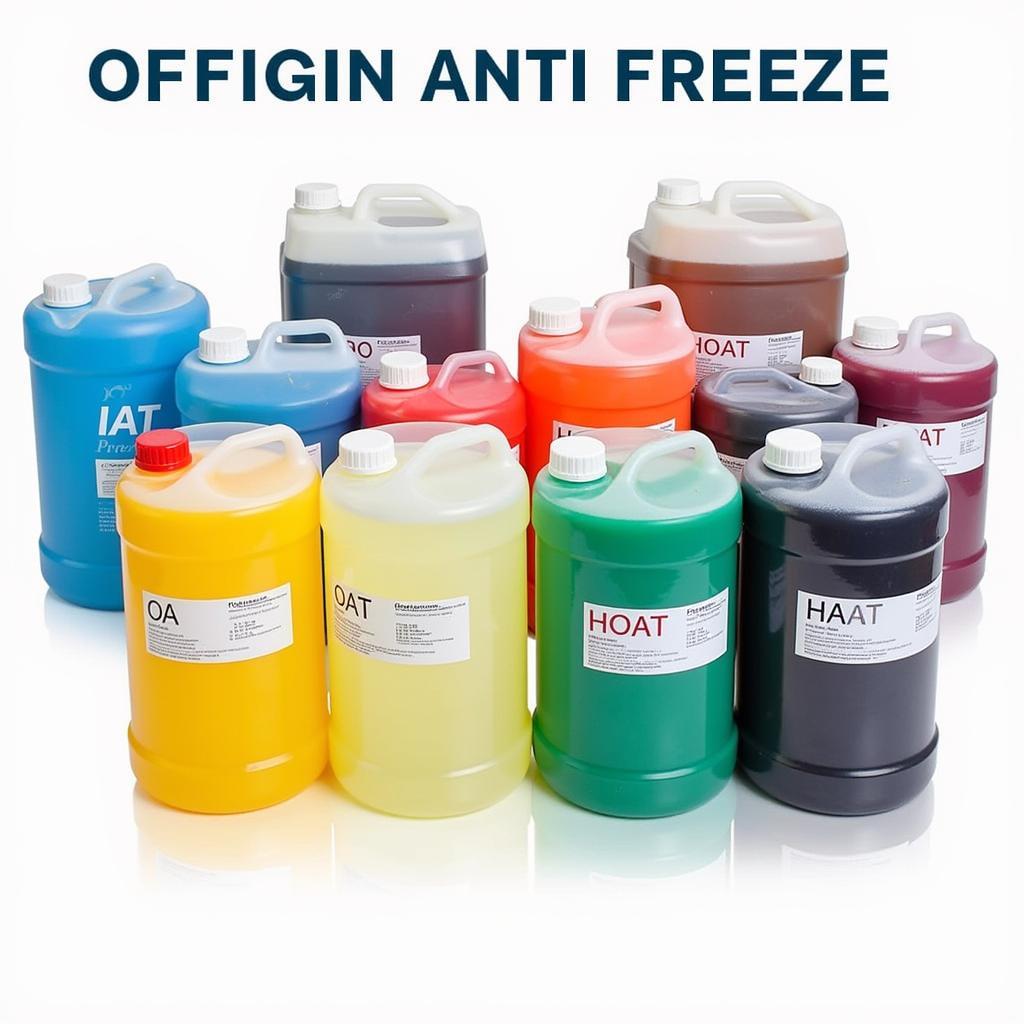Antifreeze, that crucial fluid keeping your car’s engine from overheating in the summer and freezing in the winter, comes in a rainbow of colors. But does the color of antifreeze matter? It’s a common question, and the answer is a little more nuanced than a simple yes or no. Understanding the role of color in antifreeze can help you make informed decisions about your vehicle’s maintenance.
Decoding the Rainbow: Antifreeze Colors and Their Meanings
While the vibrant hues might seem purely aesthetic, they actually serve a more practical purpose. Originally, the color of antifreeze was tied to its chemical composition and technology. Green was traditionally associated with IAT (Inorganic Additive Technology), while orange typically indicated OAT (Organic Acid Technology). However, over time, the color coding has become less standardized, making it less reliable as an indicator of antifreeze type.
 Antifreeze Colors and Types
Antifreeze Colors and Types
For instance, you might find green antifreeze that’s actually HOAT (Hybrid Organic Acid Technology), or yellow antifreeze that’s a variation of OAT. This lack of standardization means you can’t simply rely on color to determine compatibility. Therefore, checking the manufacturer’s specifications for your specific vehicle model is paramount. You can learn more about the reasons behind the different antifreeze colors in why does antifreeze come in many different colors.
Why Does Antifreeze Come in Many Different Colors?
The variety of antifreeze colors stems from the use of different dyes and the evolution of antifreeze technology. Manufacturers use dyes to distinguish their products, make leaks easier to spot, and even deter accidental ingestion due to the sweet smell of antifreeze.
As technology advanced, new formulations with different additives and lifespans emerged, leading to the proliferation of colors. So, while color once provided a rough guide, it’s now less dependable. For reliable information on the correct antifreeze for your car, you can refer to what color antifreeze.
Does Mixing Different Colors of Antifreeze Cause Problems?
Mixing different types of antifreeze, regardless of color, can potentially lead to issues. Different technologies use different additive packages that may not be compatible. Mixing incompatible antifreezes can reduce the effectiveness of the corrosion inhibitors, leading to premature rust and damage to your cooling system. It can also create a gel-like substance that can clog the system and cause overheating. Therefore, it’s generally recommended to stick to the same type of antifreeze as specified by your vehicle’s manufacturer. You can find out more about mixing coolants in does it matter if you mix coolant colors.
“The key takeaway is compatibility, not color,” says automotive expert, Dr. Emily Carter. “Matching the correct antifreeze technology to your vehicle is crucial for optimal engine performance and longevity.”
What Color Is the Antifreeze Coolant in My Car?
Identifying the correct antifreeze for your car requires consulting your owner’s manual or contacting your dealer. They can provide the specific type and color recommended for your vehicle’s make and model. You might also find a sticker under the hood indicating the correct antifreeze. Learn more about identifying your coolant type by color in what color is antifreeze coolant.
“Always prioritize using the manufacturer-recommended antifreeze to avoid potential problems and maintain your vehicle’s warranty,” advises mechanical engineer, Mr. David Miller.
Conclusion
While the color of antifreeze can be visually striking, its role in identifying the correct fluid for your car has diminished. Focus on the antifreeze technology (IAT, OAT, HOAT) rather than the color, and always consult your vehicle’s manufacturer specifications for the correct type. This will ensure optimal engine cooling and prevent costly repairs down the road.
FAQ
- Can I mix green and orange antifreeze? Generally, no. They may represent different technologies and be incompatible.
- What happens if I use the wrong antifreeze? It can reduce corrosion protection and potentially damage the cooling system.
- How often should I change my antifreeze? Consult your owner’s manual for recommended intervals.
- Can I use universal antifreeze? Check your owner’s manual for compatibility. Some manufacturers advise against it.
- Where can I find the correct antifreeze for my car? Your owner’s manual, dealer, or auto parts store.
- What does it mean if my antifreeze is rusty brown? It could indicate a problem with the cooling system.
- Can I just add water instead of antifreeze? No. Water doesn’t provide the same protection against freezing and corrosion.
Need help choosing the right color palette for your home? Explore our guide on what color pairs well with brown.
For further assistance regarding antifreeze or any other car maintenance needs, please contact us at Phone Number: 0373298888, Email: [email protected], or visit our address at 86 Cầu Giấy, Hanoi. Our customer service team is available 24/7.

